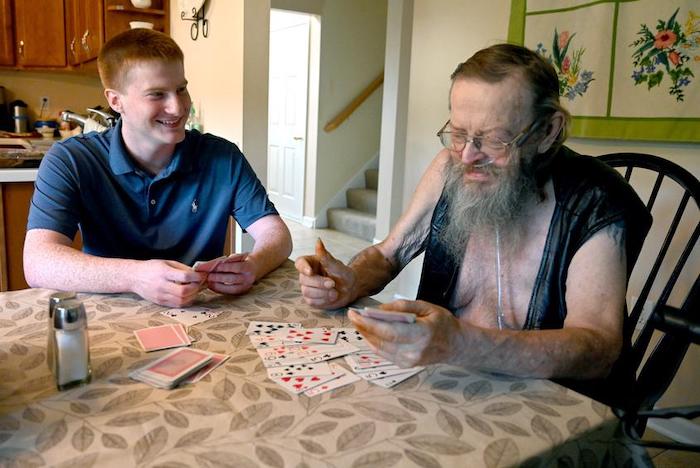
by Sara Foss
When I ask Matthew Cullen to share one of his favorite experiences volunteering at the Joan Nicole Prince Home, his answer surprises me.
“Giving my first bed bath,” he says.
When you give a bed bath, “you use a wash cloth to wash a patient’s body,” Cullen explains, adding, “The residents are really grateful for it. One resident told me, ‘Thank you for that. I feel much better.’
This is the third summer that Cullen, a senior at Union College, has spent caring for dying residents at the Joan Nicole Prince Home in Scotia.
His shifts are a mix of mundane tasks aimed at making residents more comfortable and keeping them company. Sometimes that involves chatting at the kitchen table. Sometimes it involves sitting quietly while they rest or sleep.
“A lot of time I’m the only person here,” says Cullen, a native of Guilderland.
Helping terminally ill patients live their final days in peace and comfort might sound like a lot of responsibility for a 21-year-old college student.
But Cullen is more than up to the challenge. The ebullient red-head speaks of his work at the Joan Nicole Prince Home with insight, compassion, even wisdom.
“It can be sad sometimes, but the great majority of the time, it’s happy,” Cullen says. “The patients are sharing their memories and stories with you, and you’re doing the same.
Cullen isn’t the only college student who spends his summers volunteering at the Joan Nicole Prince Home.
He’s enrolled in a unique summer program, called CARE (Community Action Research and Education), that sends college students to volunteer in residential homes for the dying, which provide free, round-the-clock bedside care to terminally ill patients whose families are unable to care for them.
CARE got its start at Union College five years ago, and has steadily evolved since then.
It is now offered in partnership with Skidmore College, and open to students from a handful of other schools, such as Siena College.
This summer there are 13 students volunteering at four different residential homes for the dying: the Joan Nicole Prince Home, Gateway House of Peace in Ballston Spa, Mary’s Haven in Saratoga Springs and Hospeace House in Naples.
“These students are seeing the dying process as it happens,” Carol Weisse, the Union College professor who founded CARE, told me.
But it isn’t all gloom and doom.
Far from it.
“There’s joy in these homes,” Weisse said. “For the students to see that, it makes death less frightening.”
Residential homes for the dying — also known as comfort care homes — serve a noble purpose.
The staff and volunteers at these facilities become a kind of surrogate family for residents, doing “everything a family member would do,” said Weisse, who directs Union’s Pre-Health Professions Program and is herself a longtime hospice volunteer.
Everyone deserves good end-of-life care, and residential homes for the dying ensure that people with little in the way of resources can get it. If anything, we need more of these homes — and more volunteers to keep them running.
CARE was initially geared toward students planning careers in health care.
The idea, Weisse told me, was to give undergraduates who might one day treat dying patients a better sense of how to communicate with and care for those with no hope for recovery. These days, CARE is open to any student with an interest in end-of-life care and a willingness to commit to the research project.
The Joan Nicole Prince Home is bright and cheery, with a back porch, meditation garden, living room and kitchen where executive director Amanda Neveu is baking cookies during my visit with Cullen. The home can accommodate two patients at a time, and each have their own bedroom and bathroom.
Neveu told me that residents — neither of whom are able to speak to me — enjoy speaking with younger people.
“It’s a legacy thing,” she said. “They want to share their stories and have them live on.”
Cullen is planning to go to medical school, as is Nurupa Ramkissoon, a 19-year-old Union College junior and Schenectady High School graduate who has spent her summer volunteering at the Joan Nicole Prince Home through the CARE program.
“It’s definitely been a little sad,” Ramkisson said. “The people who come here are very sweet, and you spend so much time with them. … There’s one resident who likes teaching, and she’s teaching us how to cook. It’s making her feel comfortable, like it’s her home.”
Weisse said her goal is to “cultivate a community of compassionate caregivers,” which sounds like a good goal to me.
At some point, every one of us is going to need a compassionate caregiver, and training students to step into this role could have lasting benefits.
Weisse believes she has created a program that could be implemented at residential homes for the dying all over the country.
“My hope and my dream is that this can spread,” she said.
And with any luck, it will.
Complete Article ↪HERE↩!
